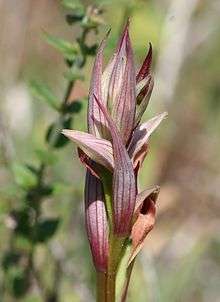Serapias parviflora
| Serapias parviflora | |
|---|---|
 | |
| Inflorescence of Serapias parviflora | |
| Scientific classification | |
| Kingdom: | Plantae |
| (unranked): | Angiosperms |
| (unranked): | Monocots |
| Order: | Asparagales |
| Family: | Orchidaceae |
| Genus: | Serapias |
| Species: | S. parviflora |
| Binomial name | |
| Serapias parviflora Parl. | |
| Synonyms | |
| |
Serapias parviflora, the small-flowered tongue-orchid,[1] is a species of orchid native to the Mediterranean Basin and the Atlantic coast of Europe.
Description
Serapias parviflora grows to around 10–30 centimetres (4–12 in) high (occasionally up to 40 cm or 16 in). At the base of the stem, there are 4–7 keeled, linear leaves, and 1–3 bract-like leaves further up the stem. The 3–8 flowers (rarely up to 12) are arranged in a spike. The greyish-pink sepals and petals form a hood over the column and the lip, which is typically 14–19 mm (0.55–0.75 in) long.[2]
Distribution
Serapias parviflora is found natively across the Mediterranean Basin from the Iberian Peninsula to the Aegean Sea, as well as in the Canary Islands[3] and along the Atlantic coast of France.[4] It was discovered in 1989 at Rame Head in Cornwall (United Kingdom), and may have dispersed there naturally.[2]
References
- ↑ "BSBI List 2007". Botanical Society of Britain and Ireland. Archived from the original (xls) on 2015-02-25. Retrieved 2014-10-17.
- 1 2 Anne Harrap & Simon Harrap (2009). "Small-flowered tongue orchid, Serapias parviflora". Orchids of Britain and Ireland: a Field and Site Guide. A&C Black. pp. 314–316. ISBN 9781408127360.
- ↑ "Serapias parviflora". John and Gerry's Orchids of Britain and Europe. Retrieved October 31, 2013.
- ↑ "Serapias parviflora Parl., sérapias à petites fleurs". eFlore – fiches plantes. Tela Botanica. Retrieved October 31, 2013.
External links
-
 Media related to Serapias parviflora at Wikimedia Commons
Media related to Serapias parviflora at Wikimedia Commons -
 Data related to Serapias parviflora at Wikispecies
Data related to Serapias parviflora at Wikispecies